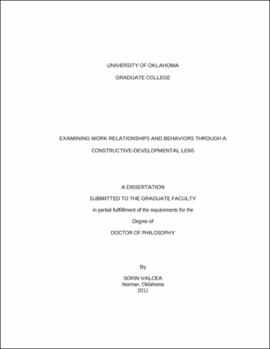| dc.contributor.advisor | Buckley, Michael R | |
| dc.creator | Valcea, Sorin | |
| dc.date.accessioned | 2019-04-27T21:22:42Z | |
| dc.date.available | 2019-04-27T21:22:42Z | |
| dc.date.issued | 2011 | |
| dc.identifier | 99134654002042 | |
| dc.identifier.uri | https://hdl.handle.net/11244/318526 | |
| dc.description.abstract | In 1979 Weick suggested that managers should strive to broaden their perspective on their organizations and their environment and develop an ability to look at situations from multiple perspectives. Building on this idea, Bartunek and Gordon (1983) pointed out that Weick's advice can be better understood through the lens of three interrelated theoretical perspectives: the principle of complementarity (Bohr, 1950) - which posits that many phenomena can be understood only when viewed from multiple perspectives, theories of cognitive complexity (Harvey, Hunt, & Schroder, 1961 ) - which suggest that some individuals are more cognitively complex and thus more able to apply multiple perspectives, and theories of adult development (Kegan, 1980; Kohlberg, 1987; Loevinger & Blasi, 1976) - which indicate that cognitive complexity is only a part of a broader pattern of development. | |
| dc.description.abstract | In my three-essay dissertation I employ constructive-developmental theories to explain why some individuals develop more positive relationships at work, and why some individuals are more proactive at work. I hope to accomplish two main things in this endeavor: develop a theoretical foundation for exploring work relationships and behaviors through the lenses of constructive-developmental theories, and develop and validate an objective instrument to assess adult developmental stages. I believe that studying the implications of adult developmental stages in work contexts is important because developmental stages influence how individuals experience organizational life, including how they interact with others in the organization, what kind of problems they find challenging, and how they approach work. Thus, applications of developmental theories in management should enhance our understanding of how to best lead, motivate, and match employees to organizations. | |
| dc.description.abstract | My first essay is an analysis of the sense making that occurs as a function of the individual's developmental level and the developmental challenges present in the environment. I apply constructive-developmental perspectives to suggest that similar to an individual, an environment (i.e., one's supervisor, work group, and organization) can also be said to be more or less developmentally advanced. As such, I explore the consequences of person-environment fit - seen through a constructive-developmental lens - on person-supervisor, person-group, and person-organization relationships. My second essay focuses on the design and validation of a more objective measure of developmental stage. Existing instruments, such as the Washington University Sentence Completion Test developed by Jane Loevinger, are projective in nature and are fairly difficult to deploy and score. To demonstrate criterion validity, I will test the relationships between developmental stages and the performing of proactive behaviors by individuals. I expect individuals at higher developmental stages to be more proactive because of their increased tolerance for ambiguity, comfort with accountability, and desire for autonomy. Lastly, my third essay will be a test of predictions with regard to the leader-member exchange relationships that develop between leaders and followers at different developmental stages. I anticipate that individuals at different developmental stages will have different theories about what good followership and good leadership is, and thus expect different things from their counterparts. | |
| dc.format.extent | 138 pages | |
| dc.format.medium | application.pdf | |
| dc.language | en_US | |
| dc.relation.requires | Adobe Acrobat Reader | |
| dc.subject | Organizational behavior | |
| dc.subject | Ego (Psychology) | |
| dc.subject | Personality development | |
| dc.subject | Constructivism (Education) | |
| dc.title | EXAMINING WORK RELATIONSHIPS AND BEHAVIORS THROUGH A CONSTRUCTIVE-DEVELOPMENTAL LENS | |
| dc.type | text | |
| dc.type | document | |
| dc.thesis.degree | Ph.D. | |
| ou.group | Michael F. Price College of Business | |
